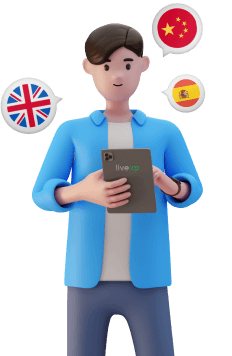
When You Should Use IN, and When You Should Use ON
I believe that knowing the differences is a great start, but you will only get the hang of using them correctly when you have opportunities to speak.

Get a FREE guide!
Want to sound like a native English speaker?
Get our free PDF with top tips that work.

Check your email!
Many beginning learners whose first language is a romance language struggle with the concept of “in” and “on” being separate concepts. In this article, I would like to talk about different ways to think of each of these prepositions to help with knowing when to use each one of them. Here are the general rules for each word:
IN
Think of yourself surrounded by something. You go into your house, or you jump into a pool. Your body is submerged or enclosed.
ON
Think of yourself on top of something. You sit on your sofa, or you walk on the floor. Your body exists above the object.
Tips to Remember When to Use IN and ON
There are exceptions to the rules when it comes to these words that may trip some learners that I will address. One of those is describing clothes. You are IN your clothes, but you put your clothes ON. The way to separate these is to think that you are inside of your clothes as you wear them, but when you are putting clothes on, they are going on top of your body.
Another common mistake is used with transportation. Most people will say phrases such as “I’m riding on the bus” or “I’m getting on the airplane now.” It doesn’t make much sense when you are comparing it to our previous definition of how in and on work. These people are not riding on top of the airplane!
Think of it more like they are climbing onto a moving platform. Yes, they will be surrounded by the bus or the plane, but when we use these terms, we think of climbing onto something that will be moving below us rather than being enclosed by a bus, train, or airplane.
There are also times we use “in” and “on” to talk about subjects that are more abstract such as “I’ve got something on my mind” or “What’s going on in your head?” This might be a little harder to understand, but try thinking that phrases that use “on” would be more inclined to be something off the top of your head, something thing ready to come out. While using “in” would suggest a deeper thought going on. Seeing that these are commonly used phrases, the more you hear people using them, the easier it will be to decipher the two in this context.
I hope this short article helped you with understanding the differences between “on” and “in.” I believe that knowing the differences is a great start, but you will only get the hang of using them correctly when you have opportunities to speak.
















